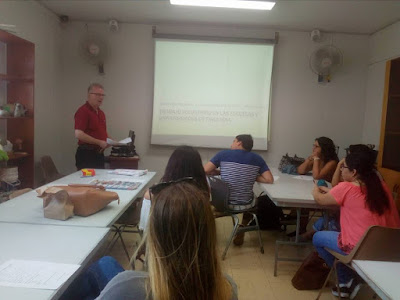Unlearn your limits
Five weeks have passed already during my stay in Lima, Peru. During that time I have managed to get quite a good idea about this huge South American metropolis - I recognize most of the broad avenidas and their whereabouts. I can also locate most of the 43 distritos that actually make this city. The local public transport system - which seemed quite chaotic in the beginning - makes now more sense. Not entirely though. And despite my earlier worries about personal safety - I have not encountered a single uneasy situation here. Not even in the district of San Juan de Miraflores - a somewhat seedy part of Lima, to say the least. Also the place where I work.
I do my practise here in an institution called Centro Cerrito Azul. This centre offers various services for children and youth with special needs in its surroundings. Most of these youngsters suffer from autism or other forms of developmental disorder. Cerrito Azul aims to provide them daily activities and training in order to develop their skills in daily routines and hence creating a better and wider integration in the local community. Cerrito Azul has been operating as a non-profit private organization since 1992 and is very much involved in the local peer activities with other local advocacy groups. The centre currently employs 10 teachers and offers voluntary based work for students. I have been personally very lucky to find a place which offers me a wide range of tasks to do my practise here. I participate in the daily routines and activities at the centre and also take part in the regular meetings both in and outside the house. And yes, all the communication here is in Spanish only.
From a Finnish point of view the local schooling and educational system differs remarkably from ours. There are a lot of private institutions all the way from the early childhood education up to the university level. And generally these private entities - sometimes quite small in size - enjoy rather good reputation. Many locals clearly claim that the private schools outclass the public schools in quality. But otherwise that that - the education seems to have the same high value as in Finland. Peruvians know well that the education is the only way out of poverty and this agenda of education corresponds well with government targets for the future.
As for the academic studies in universities - Peru has a lot to offer. Both private and state run universities. Unlike in the lower education level the question of quality is not so clear here. There are some good state run universities and also some not-so-good private universities. The actual problem with state run universities - I was told - is the risks of huelgas - i.e. strikes either those of students or university staff. And these strikes may prolong the study time remarkably,
University studies are considered by Peruvian youth a good way to well paid professions. A survey that was published in local newspaper Peru21 (25th January) shows this to be true. Eight out of ten best paid academic careers are in the field of engineering. Medical studies performed well too - ranking at #5 and so did - quite surprisingly - political sciences ranking at #9. Unfortunately, and perhaps not so surprisingly neither the Social Sciences nor Educational Sciences reached this top ten list.
What about the future then? Which business areas are predicted to offer most careers and employment in the coming years in Peru? According to this Peru21 survey the list is like this:
1) tourism and gastronomy - Peru aims to triplicate the number of incoming tourists up to 9 million (more about this subject in my next blog), 2) agribusiness - expect to see more Peruvian fruits in Finnish shops too, 3) international commerce and logistics - quite essential for those previous two, 4) engineering - mining here, as in Lapland - is a big and growing business. And not always without problems, 5) services - for information, finance, marketing....all these still quite undeveloped here.
But it is not only young people that study in Peru. More and more adults enter the universities - usually performing their studies during nights and weekends when not working. The reason is quite simple - the lack of higher education needed in the field of work.
At the end of February the Finnish educational system will be promoted here in Lima in various occasions as a part of the Finland 100 years -activities. And this week the renowned social scientists Mr and Mrs Taipale were promoting in Lima the Spanish edition of the book 100 Social Innovations from Finland. A lot of Finnish things going on here.
On my blog next week I will write about tourism in Peru. An area where both Peru and Finnish Lapland have surprisingly much in common.....on this occasion I wish to thank sincerely the Finnish Embassy in Lima for promoting Finnish Lapland in such a beautiful manner in Facebook.
 |
| Universidad Pacifico - having a presentation about voluntary work as part of studies in Finland. |
 |
| Participating a peer/advisory group meeting in San Juan de Miraflores |
 |
| A reference to the blog title - Desaprende lo que te limita. Unlearn your limits. Local technical university advertisement in metro. |
 |
| An after-work meeting with the parents. |
 |
| The Central Library of the (quite prestigious) PUCP-university. Finally managed to get a permission to use its services. Generally university areas and campuses are strictly closed for public. |
 |
| A poster promoting reading. The district of San Isidro. |

Kommentit
Lähetä kommentti
Kiitos kommentistasi! Se julkaistaan mahdollisimman pian.